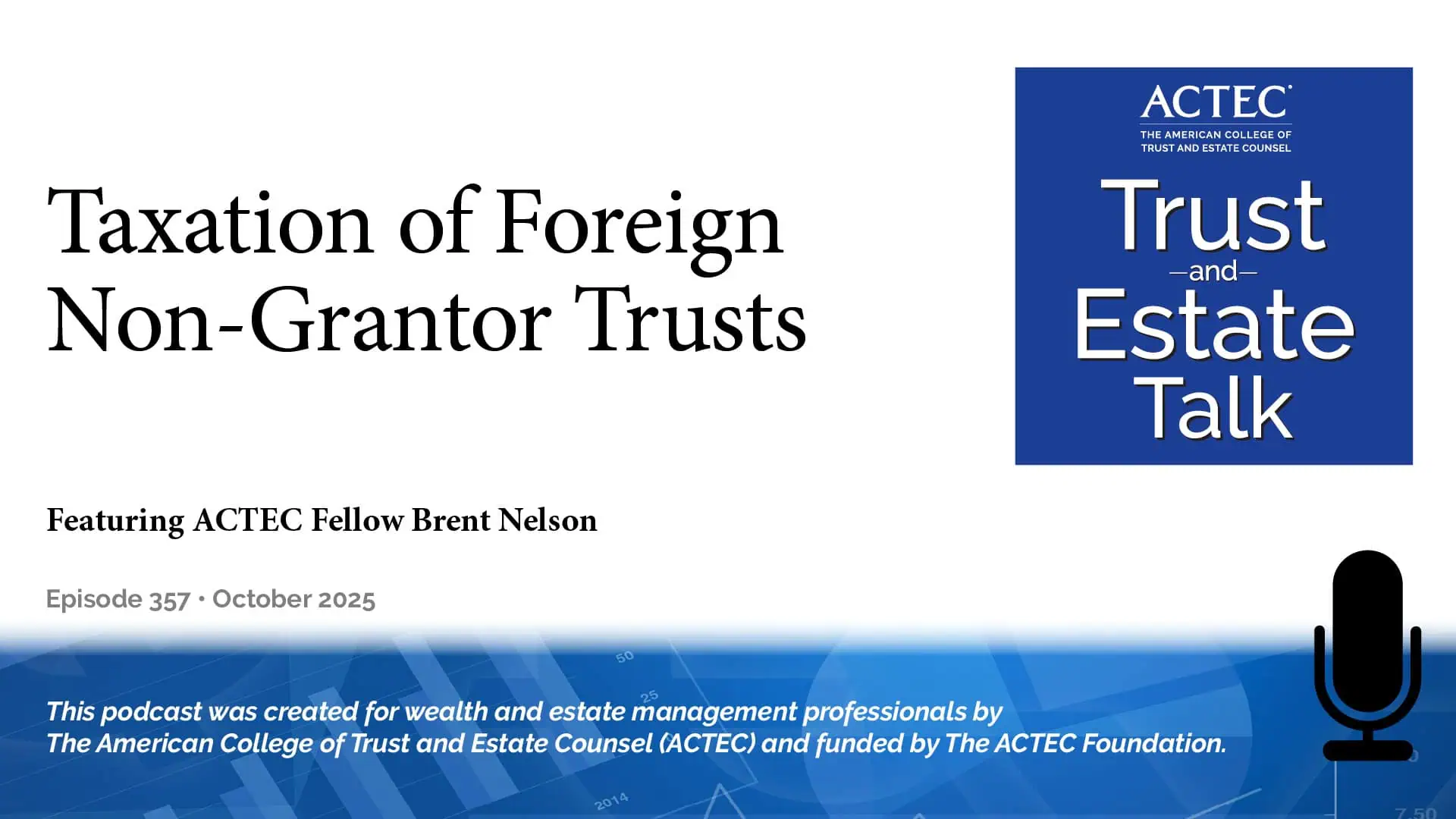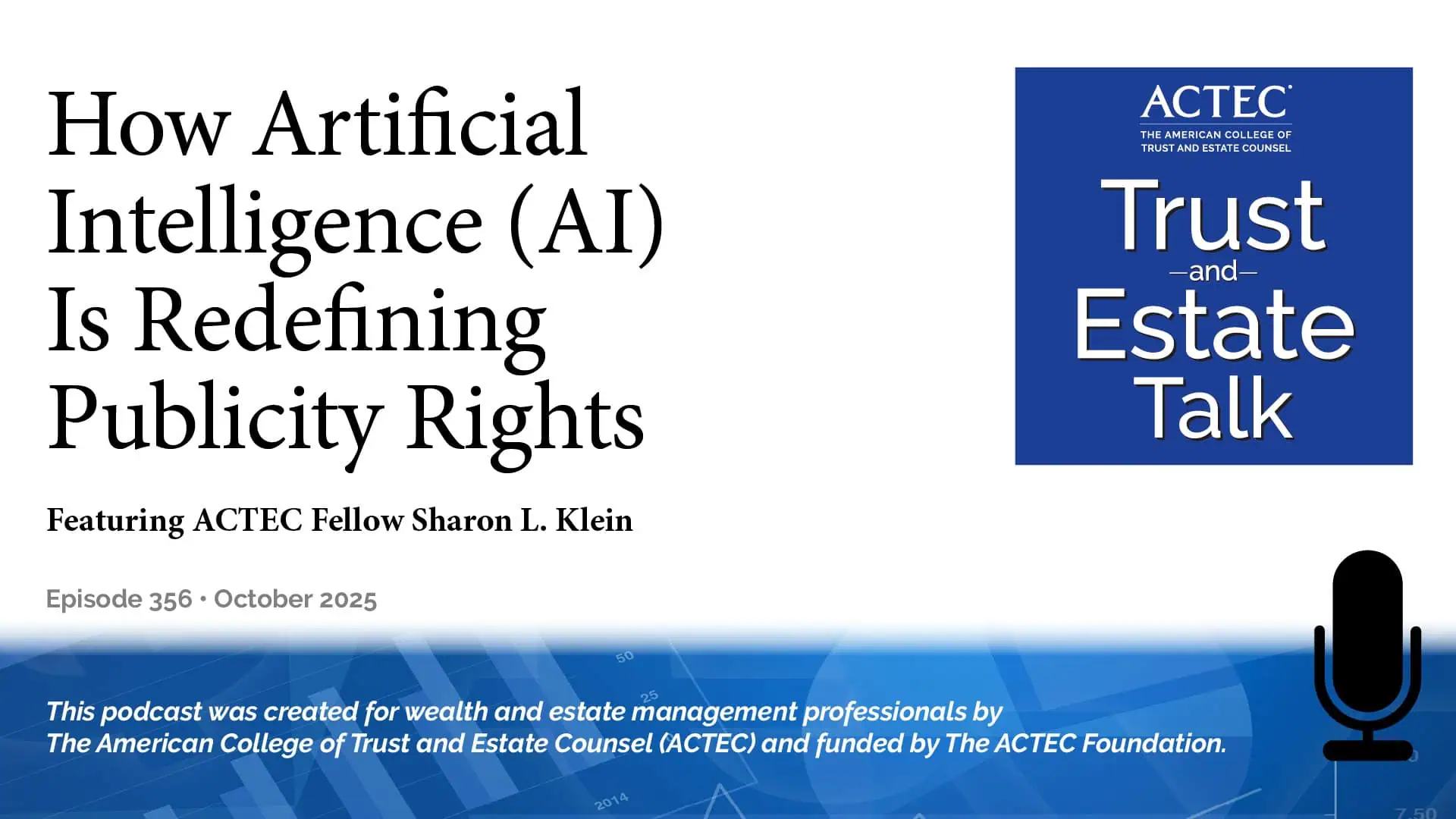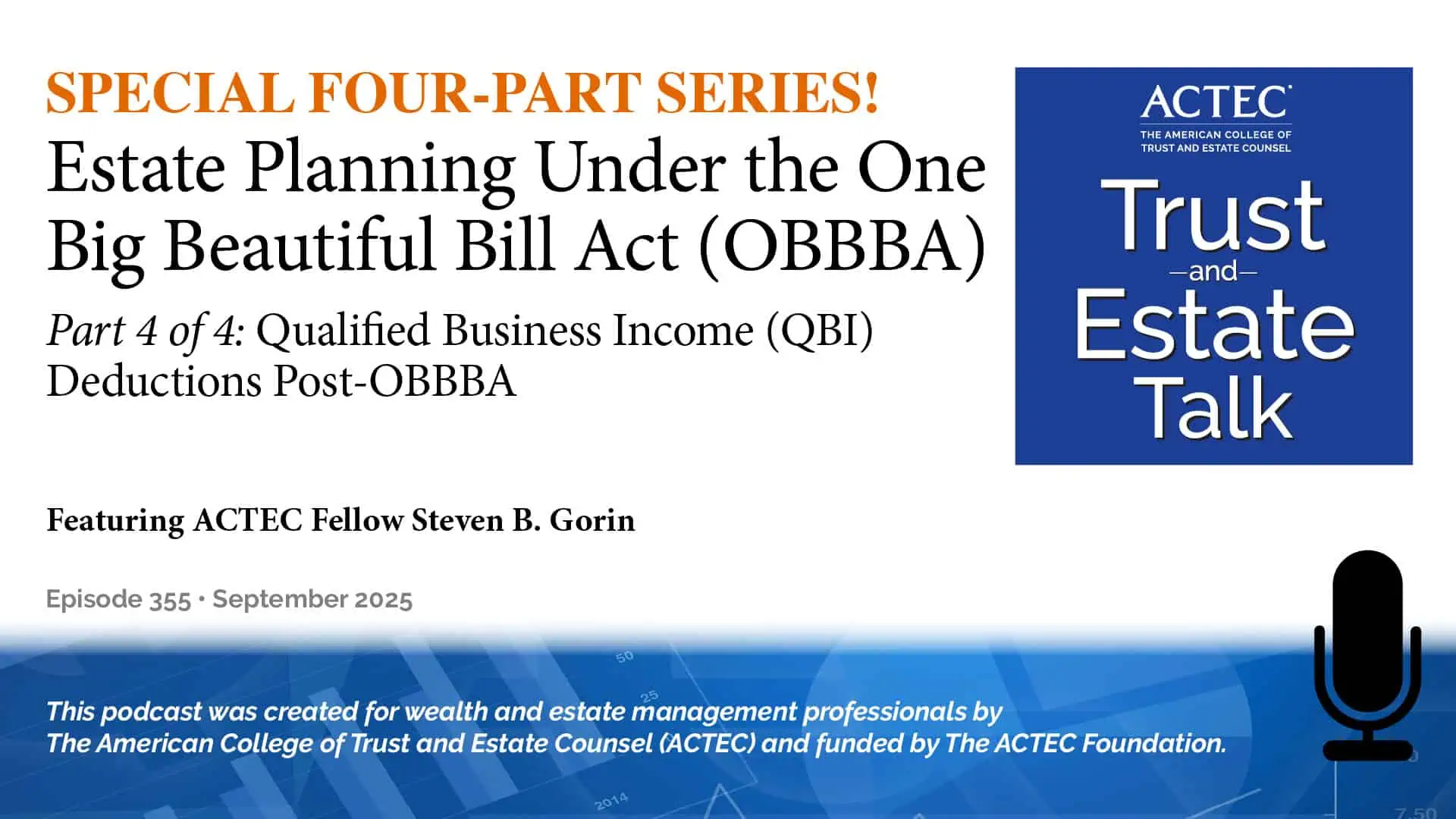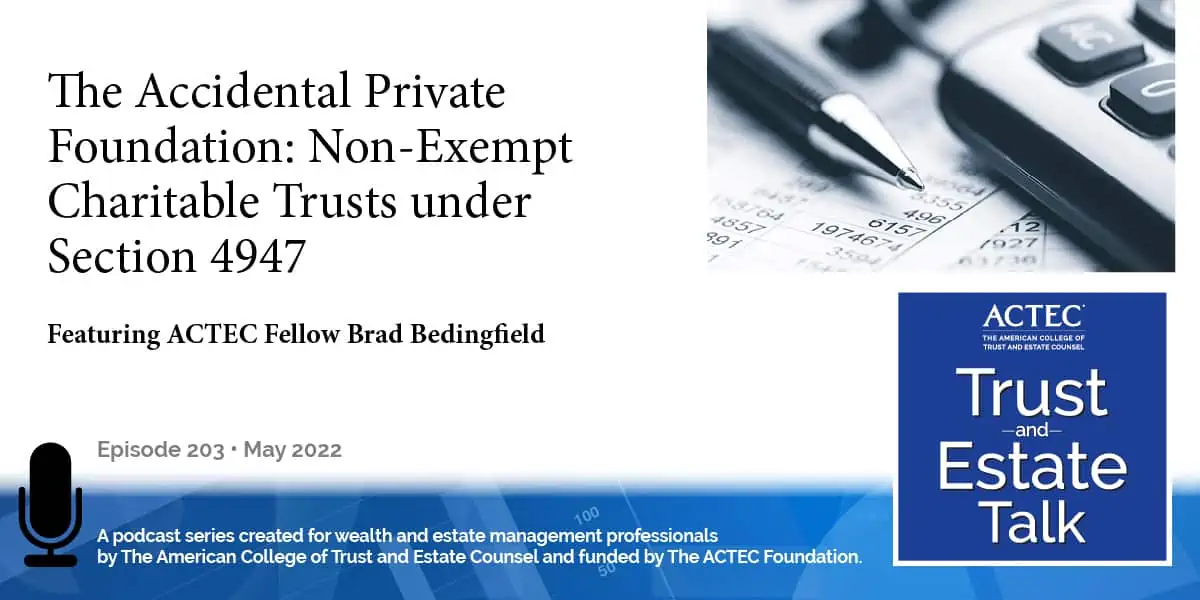The Accidental Private Foundation – Non-Exempt Charitable Trusts Under Section 4947
“The Accidental Private Foundation: Nonexempt Charitable Trusts Under Section 4947,” that’s the subject of today’s ACTEC Trust and Estate Talk.
Transcript/Show Notes
This is Travis Hayes, ACTEC Fellow from Naples, Florida. Trusts for exclusively charitable purposes which do not have IRS determination letters may be subject to the Private Foundation Rules. ACTEC Fellow Brad Bedingfield of Boston, Massachusetts, joins us today to speak about the consequences of the treatment of nonexempt charitable trusts under Section 4947(a)(1), how to avoid or manage those tax consequences and treatment, and planning pointers connected with a non-exempt charitable trust. Welcome, Brad.
Treatment of Nonexempt Charitable Trusts
In 1969, Congress introduced new rules imposing certain restrictions and requirements on private foundations. These include a required minimum distribution, rules against related party transactions (the self-dealing rules), limitations on holdings of active businesses and certain risky investments, and distributions to organizations other than public charities or for noncharitable purposes. These rules apply to trusts, corporations, and other entities that receive IRS determinations that they are 501(c)(3) charities, but do not qualify as public charities. However, it is possible to set up a trust that supports only charities and for which donors can get income, gift, and estate tax deductions, but which does not get an IRS ruling that it is a private foundation.
Characteristics of IRS Section 4947(a)(1)
If not for Section 4947(a)(1) of the tax code, these trusts would provide a way to get most of the benefits of private foundations without having to comply with the onerous private foundation rules. Section 4947(a)(1) was enacted to prevent this. Section 4947(a)(1) applies to trusts that have two characteristics. Characteristic number one is that all of the unexpired interests must be devoted to one or more purposes described in Section 170(c)(ii)(b). That describes generally what we think of broadly as charitable purposes: religious, charitable, scientific, literary, educational, prevention of cruelty to animals or children. But, per the Treasury Regulations, it’s actually a bit broader than that.
Other purposes that are described in Section 170(c), for which you can get income tax deductions, can trigger section 4947 as well. That includes 170(c)(i), which is support for governmental organizations for exclusively public purposes. It also includes purposes described in 170(c)(iii), certain U.S. War Veterans Post, and 170(c)(v), certain cemetery companies. These kinds of trusts for these exclusively charitable or other tax-deductible purposes can be set up purposely during lifetime or on death, or they can arise as part of the transitional phase. For example, a 4947(a)(2) split-interest trust, like a charitable remainder trust, once the life interest ends, that becomes a 4947(a)(1) trust because, at that point, all of the unexpired interests are devoted exclusively to charitable purposes.
In addition, estates and trusts which entirely benefit charities, or a portion of which entirely benefit charities, can become section 4947(a)(1) trusts if the estate administration goes on too long. The estates and trusts are treated as “estates and trusts” for tax purposes for a reasonable period of administration. But if the administration goes on beyond that, and that’s the facts and circumstances determination, then the IRS will deem the estate or the trust to have ended for income tax purposes and a 4947(a)(1) trust to arise. And this can be a surprise to executors and trustees who aren’t ready for it.
We’re used to, as executors and trustees, thinking about the self-dealing rules for private foundations creeping back from the private foundations that eventually might get these funds into the estate administration period. We’re not used to thinking about the other private foundation rules as doing the same, but they can if the estate administration goes on too long, and it’s important to be aware of that for long developing estates and trusts. So, that’s characteristic number one. All of the unexpired interest are devoted to one or more purposes described in Section 170(c)(ii)(b).
Characteristics of 4947: Charitable Deduction
The other characteristic, number two, is that a charitable deduction must have been allowed. Either going into this trust or going out of this trust. That could be the income, the gift or the estate tax charitable deduction for assets coming into the trust, or it could be the income tax deduction for assets going out of the trust under Section 642(c). If you don’t take any of these deductions, then you can actually avoid Section 4947(a)(1) treatment, even for a trust that is exclusively for charitable purposes. And there may be circumstances where you want to do that.
For example, if you need to have some sort of purchase transaction between the trust and someone who would be a disqualified person under the self-dealing rules you can’t do that if the trust is a 4947(a)(1) trust and the private foundation rules apply. But if you avoid taking the tax deductions, if it otherwise makes sense to do that- for example, if you have an estate that is below the estate tax exemption amount- then you’ve got more flexibility in terms of the kinds of transactions that you can enter into it with that trust, with the private foundation rules not applying.
One consideration is that under the Treasury Regulations, a trust is presumed to have taken one of these deductions if the deduction would have been allowable, whether or not it was actually allowed, unless you can demonstrate that it did not. So, in the scenario where you have an estate that is below the federal estate tax exemption amount, and you want to avoid the application of section 4947(a)(1) so that you can have a transaction between a disqualified person and the trust, you may want to consider filing a Federal Estate Tax return, even if you otherwise didn’t need to, so that you can clearly opt-out of any of these tax deductions and overcome that presumption in the Treasury Regulations.
Charitable, not Tax Exempt
So, if you are deemed to be a 4947(a)(1) trust, what are the consequences of that? Well, a 4947 (a)(1) trust is treated as if it were a 501(c)(3) organization for some purposes, but not for other purposes. It’s treated like a 501(c)(3) organization for purposes of the income, gift, and estate tax charitable deduction rules. You can get an income, gift, or estate tax deduction, even though the trust does not have an IRS determination letter. You can also get a Section 642(c) income tax deduction for distributions going out, even though it doesn’t have an IRS determination letter. These trusts, section 4947(a)(1) trusts, are subject to the rules of section 508(e), which says that any trust that wants to take advantage of these tax benefits has to have certain provisions in its governing documents, specifically those that say we’re going to comply with the private foundation rules.
So, it’s important to either have those in there or confirm that in your state, as in many states, those particular provisions are deemed to apply to your trust. A 4947(a)(1) trust is not treated like a 501(c)(3) organization, however, for purposes of actual 501(c)(3). 501(c)(3) is the provision that says that these organizations are exempt from tax, but a 4947(a)(1) trust is not, itself, exempt from tax. In fact, it’s required to file two different tax forms for years in which it has taxable income. It has to file a Form 990 series just like a private foundation does, but it also has to file a Form 1041 if it has any taxable income, even if that income is offset by deductions.
4947(a)(1) Taxes, Termination, and Planning Tips
And the tax that applies to a 4947(a)(1) trust is essentially the greater of whatever the tax would be if the trust were a private foundation. That’s the 1.39% net investment income tax, plus any unrelated business income tax, and what the tax would be if this were just a complex trust taxed on ordinary income and capital gains, and everything else at regular trust rates but with the possibility of the section 642(c) deduction offsetting much or all of that income. A 4947(a)(1) trust, most importantly, is treated like a 501(c)(3) organization for purposes of the private foundation rules, and this is the primary purpose and impact of this section of the Code.
And, also, for the rules regarding termination of private foundations (the section 507 rules), so it’s important for a trust like this to be careful on termination, just as we do with private foundations to make sure that you don’t trip up on those rules. Now, in theory, a trust can be a 4947(a)(1) trust and meet the test for a supporting organization and avoid the private foundation rules. This used to be far more common back prior to 2006, when it was easier for trusts to qualify as type 3 supporting organizations. Now it’s much less common, but it is theoretically possible. If a trust is a 4947(a)(1) trust and wants to avoid the application of the private foundation rules, it has two options for doing that.
One is just to go ahead and file a Form 1023 application and be characterized as a supporting organization. The other is to file the Form 8940 and to show that you meet the test for a supporting organization. That’s a somewhat lesser process, and the result of that is that the IRS recognizes you as a 4947(a)(1) trust that satisfies the test of a supporting organization. You’re still, in that case, required to file a Form 1041 if you have any taxable income, but then you don’t have to file the Form 990-PF. Instead, you file a Form 990 and you don’t have to apply the private foundation.
Section 4947(a)(1) Planning Pointers
A few planning pointers with respect to section 4947(a)(1) trusts – first, anticipate what might constitute a section 4947(a)(1) trust. In particular, if you are involved in an estate or a trust where a significant portion, or all of the assets, are going to charity and the administration of that estate or that trust is taking a long time, consider whether there might be a risk that the trust will be deemed to have terminated for federal income tax purposes, in which case all of these rules may suddenly apply.
If a 4947(a)(1) trust will continue for some period of time, consider going ahead and filing a Form 1023 application. It’s not particularly complicated to do and, once it’s done, you eliminate the need to file a Form 1041 (if you have any taxable income) in addition to the Form 990 series return.
If you are a 4947(a)(1) trust, assume that the private foundation rules are going to apply to you unless the trust would qualify as a supporting organization and you get a determination to that effect from the IRS. Finally, given the current high federal estate tax exemption amounts, if an estate plan sets up a fully charitable trust and there is some need to do something that the private foundation rules would not allow, consider not claiming any charitable tax deductions, either going in or coming out, to avoid application of these rules and give yourself more flexibility with respect to the ultimate disposition of that trust.
Thank you, Brad, for educating us about nonexempt charitable trusts and the application of section 4947(a)(1).
You may also be interested in
This podcast was produced by The American College of Trust and Estate Counsel, ACTEC. Listeners, including professionals, should under no circumstances rely upon this information as a substitute for their own research or for obtaining specific legal or tax advice from their own counsel. The material in this podcast is for information purposes only and is not intended to and should not be treated as legal advice or tax advice. The views expressed are those of speakers as of the date noted and not necessarily those of ACTEC or any speaker’s employer or firm. The information, opinions, and recommendations presented in this Podcast are for general information only and any reliance on the information provided in this Podcast is done at your own risk. The entire contents and design of this Podcast, are the property of ACTEC, or used by ACTEC with permission, and are protected under U.S. and international copyright and trademark laws. Except as otherwise provided herein, users of this Podcast may save and use information contained in the Podcast only for personal or other non-commercial, educational purposes. No other use, including, without limitation, reproduction, retransmission or editing, of this Podcast may be made without the prior written permission of The American College of Trust and Estate Counsel.
If you have ideas for a future ACTEC Trust & Estate Talk topic, please contact us at ACTECpodcast@ACTEC.org.
© 2018 – 2025 The American College of Trust and Estate Counsel. All rights reserved.
Latest ACTEC Trust and Estate Talk Podcasts

Taxation of Foreign Non-Grantor Trusts
Learn how U.S. tax rules affect foreign non-grantor trusts and discover key strategies for cross-border estate planning and compliance.

How Artificial Intelligence (AI) Is Redefining Publicity Rights
Explore how AI, deepfakes, and digital replicas are reshaping publicity rights, estate planning, and legacy protection.

Qualified Business Income (QBI) Deductions Post-OBBBA
Learn how the One Big Beautiful Bill Act changes the Qualified Business Income (QBI) Deduction, expanding phase-in ranges and tax planning opportunities.



